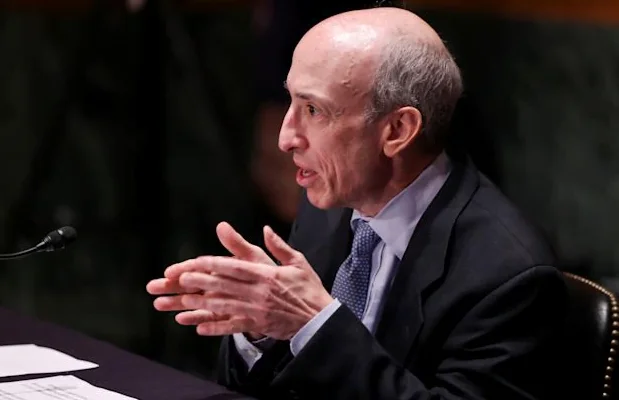Gary Gensler, the chairman of the Securities and Exchange Commission (SEC), expressed concern that a proposed bill to create a regulatory framework for cryptocurrencies could impair investor safeguards in existing financial markets.

Senators Cynthia Lummis (R-WY) and Kirsten Gillibrand (D-NY) submitted a measure on June 7 that Gensler was asked about at The Wall Street Journal’s CFO Network Summit on Tuesday (D-NY).
“We don’t want to undercut the protections we have in a $100 trillion capital market,” he responded, adding:
“We don’t want our current stock exchanges, mutual funds, or public companies to, sort of inadvertently by a stroke of a pen, say ‘you know what, I want to be non-compliant as well, I want to be outside of this regime that I think has been quite a benefit to investors and economic growth over the last 90 years.’”
The Lummis-Gillibrand “Responsible Financial Innovation Act” intends to address various aspects of crypto regulation, including taxation of digital assets, stablecoins, and agency jurisdiction.
While one part of the bill grants the Commodity Futures Trading Commission (CFTC) “clear authority” over digital asset spot markets, Gensler has long maintained that most cryptocurrencies are securities subject to the SEC’s jurisdiction.
Senators have mainly agreed with Gensler’s stance, noting that under the proposed bill, some cryptocurrencies would likely be classified as securities, while Bitcoin (BTC) and Ether (ETH) would be classified as commodities.
At the summit, Gensler stated that the SEC has no plans to expand its jurisdiction and that some cryptocurrencies currently fall under the agency’s purview because they qualify as security:
“We’re just looking out for the retail public […] These tokens are being offered to the public, and the public is hoping for a better future. That’s the characteristics of an investment contract.”
Meanwhile, CFTC Commissioner Christy Goldsmith Romero — who claims she hasn’t seen the Lummis-Gillibrand bill – applauded congressional regulatory action at a Tuesday event.
Romero, who earlier served as a senior counsel in the SEC’s enforcement section, was questioned if the perception that the CFTC was a more lax regulator than the SEC was correct.
“No, not at all […] they’re actually pretty similar,” she said, adding that the CFTC has brought multiple enforcement actions in the crypto space, and each agency cares about having “rigorous oversight of markets.”
Romero said the CFTC has authorized more Bitcoin items to trade on its regulated exchanges, with 18 products trading across 11 regulated entities:
“What that means is that the CFTC is pretty experienced and how to regulate trading in this market, and that’s really, really helpful as we move forward. It’s still going to take cooperation and coordination with the SEC, I’m 100% committed to that, that’s my former home.”
